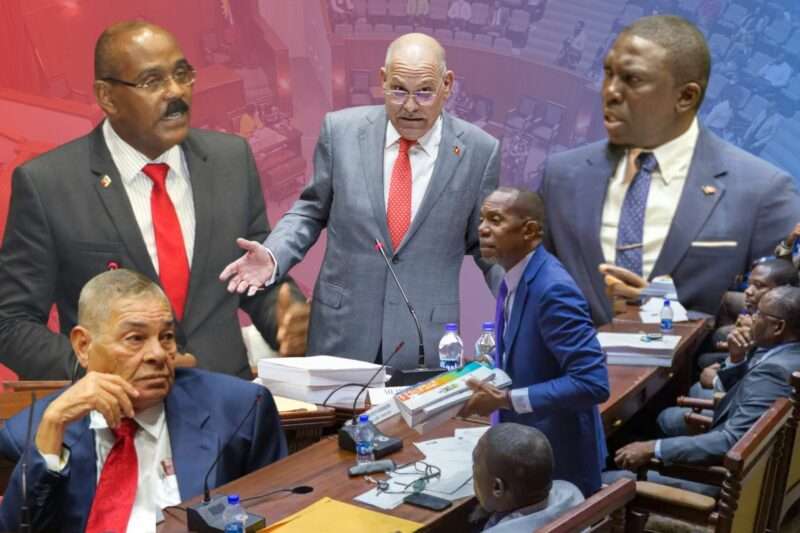
Parliamentary Reform is Overdue
By Kieron Murdoch | Opinion Contributor
Citizens should use the occasion of the upcoming commemoration of independence to think seriously about the Parliamentary system in Antigua and Barbuda, how it has served us, and how it may be improved. Despite its strengths, it is in need of reforms aimed at improving its effectiveness and its ability to be a check on the executive.
In Part 1, we discussed what ought to be among the essential functions of a democratic, elected assembly, including representation, deliberation, legislation, and oversight. We also examined the manner in which our system is deprived of key features that support these functions such as a significant backbench, more ordinary MPs than ministers, a functional Shadow Cabinet, and parliamentary committees.
We focus now on the importance of committees. We can often be oblivious to what we are lacking if we have always lacked it and have never taken notice of it elsewhere. In the modern day, effective committee oversight of executive leaders has become the primary mechanism by which legislatures demand day-to-day accountability from the executive branch.
Unfortunately, this is still not the case in Antigua and Barbuda. If you have ever glimpsed the proceedings of Parliament in Jamaica, Trinidad and Tobago, the UK, you may at times see Permanent Secretaries, Department heads, the CEOs of statutory corporations, or even Ministers themselves, answering questions before committees of elected representatives. Have you ever in your life seen such a thing here?
A minister sermonising into an ABS TV camera for an hour from his or her parliamentary pulpit is not being accountable. Physically arriving at the Parliament building ready to share with the public what you deem fit is not being accountable. There must be a process which involves MPs having the ability to interview public officials and systematically access the government records to examine the effectiveness of government policy and the truth behind what executive leaders say. That is the role of committees.
Had we a Select Committee on Law Enforcement & Public Safety for example, then in 2018, Atlee Rodney, who was then the Deputy Police Commissioner, might have been summoned to answer for how officers allowed suspected serial killer Delano Forbes to casually escape custody and what steps were later taken to prevent such a thing happening again. The Public Safety Minister might have been summoned too.
Were there a parliamentary committee for oversight of the Citizenship by Investment Programme (CIP), then the dubious 2016 proposal to open an embassy in war-torn Iraq (soon to be invaded by ISIS) to fast-track the processing of Iraqi citizenship applications would have certainly been ferociously questioned by any MPs worthy of their office.
That, along with the proposed $1.5 billion condominium project at Pensioner’s Beach colloquially dubbed “The Iraqi Village”, would surely have seen the then-CEO of the CIP Unit and the Prime Minister, responsible for the CIP, summoned to explain how anyone could have thought either of those things were good ideas.
Had we a Select Committee on Energy & Public Utilities, water managers and the Minister might be summoned to discuss the situation with regularity. Were the constitutionally mandated Public Accounts Committee doing its job at the time, it might have sought to have officials explain the reasoning behind the decision to spend millions of dollars on purchasing the Deluxe Cinema property in 2018 to ostensibly turn it into a performing arts centre. What has become of that?
In the budget debate of 2021, Prime Minister Gaston Browne alleged without evidence, on live TV, that at some point in his administration, MP Asot Michael, while a Minister in Browne’s Cabinet, obtained a tax waiver from the Cabinet (of which he was a member) by falsely undervaluing a property deal in support of a decision to grant the waiver.
The Prime Minister declared there was “a lot more” he knew of, but was admittedly withholding. Surely, were there a Select Committee on Ethics & Integrity in Public Life, it would have asked both honourable gentlemen and perhaps the Attorney General to answer a few pertinent questions about the allegation.
Between November 2022 and January 2023, a government endorsed, Africa to the Caribbean, air bridge venture – Antigua Airways – ended up landing travellers here who turned out to be migrants seeking onward passage. None could forget the tragedy in March of 2023 when on overloaded boat with dozens of them sank near St. Kitts, resulting in the loss of many lives.
This is where one would expect to see the Chief Immigration Officer, the Minister for Immigration and officials involved in greenlighting the venture asked to appear before a select committee and provide explanations as to what may have led to such a tragic outcome and what measures had been put in place to prevent a repeat.
These are the sorts of issues that should attract the corrective action of a national assembly. Ministers should lose Parliament’s confidence. Cabinet members should be replaced when they run afoul of ethics or fall short of performance demands. Departmental heads should be held accountable for gross incompetence when it occurs. Here, nothing of the sort happens.
Here, Parliament and Cabinet are either virtually the same body, or the Cabinet is the dominant numerical block in Parliament, thereby monopolising the exercise of the Parliament’s will. When a government is elected, it governs with few constraints beyond its own conscience or by whatever it may assume to be the upper limit of the populace’s tolerance for maladministration.
That said, there are still more malfunctions yet to discuss. What of the Senate? The Senate is a politically impotent body where members owe their vote to the person upon whose advice they were appointed. Government senators dare not vote down a Bill, lest they be Anthony Stuarted, or Colin Derricked, or Wigley Georged.
If you have a pulse and are sober, you will have realised that senators show allegiance first to their party, as it was not an electorate that put them in the Senate, but a political leader. Those who still hold some sort of romantic view of the Senate are an amazement.
Further, there is no honest person to be found, alive and sober, who would say that the moderation of the House and the Senate by Speakers and Presidents over the decades has been without political bias. Then there is the fact that Parliament itself is not regularly in session. It meets only periodically, and generally at the nudging of Cabinet so that Cabinet policy may be passed as legislation.
Moreover, the debate in Parliament often leaves much to be desired. Members often drone on aimlessly for an hour when it is not necessary, straying into anecdotes about everything from the good old days, to who is receiving “brown paper bag” money. Political attacks and innuendos have become increasingly normal. It’s as if they were speaking on party radio and not in Parliament. It’s as if they don’t perceive a difference. It’s appalling.
And is it ever really a debate? No one is yielding to anyone, ever. It is a series of one hour speeches to which each member is apparently entitled. There is hardly any back and forth. Thankfully however, questions to ministers have become more frequent. Grandstanding is still too common though, with members taking excessive opportunities to lavish colleagues or their party with copious praise.
There have been times when bills have either not been circulated beforehand, or members have simply not read them. Anyone who has paid attention over the years cannot say that they have not seen members of the Lower or Upper Houses at times reading and attempting to understand a Bill in the very moment.
In spite of all of this – the dominance of the Cabinet in the Parliament, the absence of a back bench, the neither here nor there Shadow Cabinet, the absence of effective committees, the lack of unbiased moderation, a Senate that adds little, and debate that is at times unparliamentary – you will still find those who feel that nothing ought to change.
Some are so accustomed to things as they are, that they assume that such is the way things ought to be. It is quite possible that even those whom we elected have so long grown accustomed to the routine malfunctioning of political institutions that they too find it difficult to understand that serious improvements are necessary.
Others are simply dishonest. They recognise the system is flawed but it serves their interests whilst they are in power, so they claim that change is unnecessary. These are often partisans of the most socially corrosive sort. It is their lot in life to get irritable at the mere inference of anything that suggests that things are not as they ought to be, or worse, that an elected person with the power to change those things, should be held accountable for not doing so.
You might be forgiven for wondering whether they actually take an absolutist’s view of government authority. A mandate for them is like a divine right and they sometimes speak as if they believe that an elected government should operate without the constraint or fetter of the law, the people, the Parliament, or the judiciary.
Interestingly, they often perceive themselves as patriots. But they practise hollow patriotism. They are not devoted to the service of their country, but rather, to the service of realising a vision of their country which has them, their party, or their tribe at its centre. The writer A. H. Cooper-Prichard quoted the poet Oscar Wilde as having said to him in conversation, “Exaggerated patriotism is the most insincere form of self-conceit” and “Patriotism is the virtue of the vicious.”
Such a crowd should never prevent right thinking citizens from demanding the steady progress of their already stable representative democracy toward improvement and not toward stagnation. The issues pointed to affect all of us. They limit the effectiveness of our elected assembly and impede the improvement of our democracy.
This virtually always delivers an absolute fusion of executive and legislative powers to whomever wins an election and leaves an executive with no effective legislative oversight for the entirety of its term in office. It provides no parliamentary resistance to executive overreach and leaves governments restrained only by the conscience of their members. It allows wastage and maladministration to occur without consequence and without review.
You must as a citizen ask yourself: What kind of system is this? How well has it served us? Why has it not been changed? Ultimately, governments do what citizens demand. It merely depends on how earnestly citizens demand something. Those in power seldom elect to have that power further restrained in the interest of those whom they serve. Unchecked power is often too cosy a thing to relinquish.
We published a Part 1 to this editorial on October 28th. Read it here:
About the writer:
Kieron Murdoch worked as a journalist and later as a radio presenter in Antigua and Barbuda for eight years, covering politics and governance especially. He is an opinion contributor at antigua.news. If you have an opinion on the issues raised in this editorial and you would like to submit a response by email to be considered for publication, please email [email protected].






It is called Democracy. Until we understand that Democracy is not what we think it is, we will never see true freedom. Selfishness will always be the order of the day when we elect greedy people into power and the country suffers for our mistake. Majority rules in a Democracy, but the majority is not always right. The problem is that they always get what they want because it is a democratic process.
Blah, blah, blah. Mankind is basically prone to malice, envy, boastfulness, deceitful and self-serving imaginations. At least in our version of democracy any fowl or crab can say what they wish with impunity, to a large extent and there will always be a donkey or parrot to echo the noise. Show me the Utopian model where all these virtues are in evidence then I might be inclined to read this C grade “editorial” to its boring end.